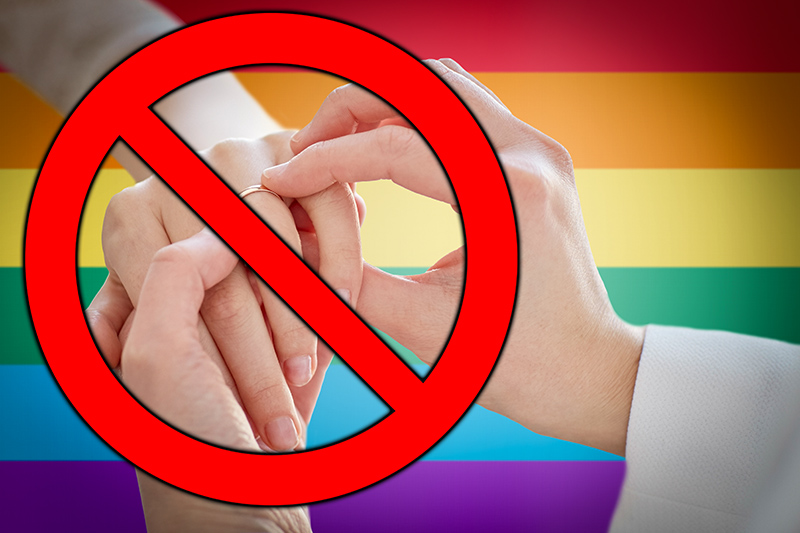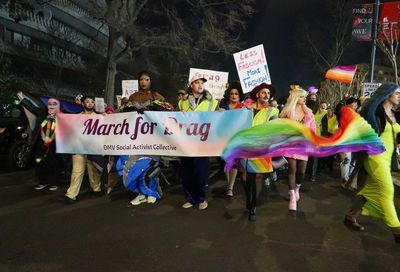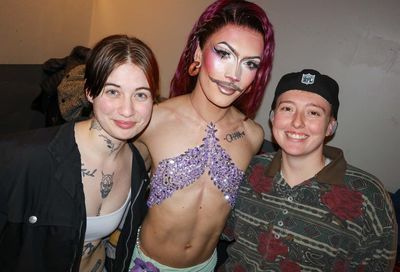Virginia's Vexing Politics
State politicos see possible course correction on anti-gay extremes come November

As the saying goes, ”Virginia is for lovers.” While few would argue the tourism slogan applies to gay people, one might wonder when the state will reach its anti-LGBT bottom.
An approved 2006 constitutional amendment banned gay marriage or any legal status or unions that ”intend(s) to approximate the design, qualities, significance or effects of marriage.” Same-sex couples are not allowed to legally adopt, though LGBT individuals still may. There are no laws protecting LGBT people from employment discrimination.
The stakes were upped during this year’s General Assembly session, when the Republican-controlled Legislature passed a bill that allows private adoption agencies that contract with the state to adopt a ”conscience clause” that allows them to discriminate against potential parents based on a variety of characteristics, including sexual orientation, if doing so would violate an agency’s stated or written religious or moral convictions or policies.
Efforts to pass a bill this session prohibiting discrimination on the basis of sexual orientation and gender identity failed in committee.
On May 15, the House of Delegates rejected an openly gay prosecutor, Tracy Thorne-Begland, a former Naval officer, for a judgeship on the Richmond Circuit Court after conservative activists and legislators led a campaign to scuttle his nomination.
With developments like these, it’s not hard to see how some may view the commonwealth as openly hostile to LGBT people, says Lawrence Webb, who was elected to the Falls Church City Council in 2008, becoming the first out gay African-American elected official in Virginia, though he lost his re-election bid earlier this month.
”For me I would say that statewide on LGBT issues, we have a very long way to go,” Webb says. ”The Tracy Thorne-Begland rejection crystallizes that when a person who served his country effectively and served well as a prosecutor, who is woefully qualified to be a District Court judge, but is rejected, that, to me, speaks volumes.”
Webb says that the recent spate of legislation – and Thorne-Begland’s rejection in particular – has energized the LGBT community and allies, who see clear-cut discrimination.
According to Larry Sabato, a political analyst and professor of politics at the University of Virginia and director of its Center for Politics, Virginia’s Republican Party is a mix of establishment politicians, such as Gov. Bob McDonnell and Lt. Gov. Bill Bolling; and tea party types, like Attorney General Ken Cuccinelli. Sabato says that the 2013 gubernatorial race will show which side is stronger if, as expected, Bolling and Cuccinelli face off for the nomination.
Sabato also notes that those who run statewide in Virginia can be socially conservative and appeal to the GOP base, but also ”exude economic pragmatism that appeals to suburban swing voters.”
Arlington County Board Member Jay Fisette, a gay Democrat, sees evidence of changing attitudes among Virginians with respect to social issues, including LGBT rights. He says younger residents, as well as the state’s growing Latino population and people who live in Northern Virginia are overwhelmingly supportive of LGBT rights.
Fisette says that despite members of the General Assembly backing ”bizarre, extreme” legislation, their actions are not necessarily reflective of their constituents.
”I would venture to say that the legislation isn’t even wanted by some Republicans, because they know it hurts them and makes them a laughingstock,” he says.
David Lampo, vice president and political director for the Log Cabin Republicans of Virginia and the author of a book set to be released in August, A Fundamental Freedom: Why Republicans, Conservatives and Libertarians Should Support Gay Rights, says Virginia’s Republicans should be embarrassed that they allowed Del. Bob Marshall (R-Manassas), who led the charge to block Thorne-Begland, to become the face of the party on LGBT issues.
Lampo says he knows several Republicans who voted against Thorne-Begland who did it for reasons other than anti-gay animus. But by allowing Marshall and his allies, like The Family Foundation, to dominate the debate, he says, the Republicans have allowed themselves to be painted as stridently anti-gay.
”All people will remember is a gay judge got voted down, in their minds because he was gay,” Lampo says. ”It’s another black eye for the party.”
Calls to Marshall and The Family Foundation were not returned.
Marshall, a candidate for the U.S. Senate and the sponsor of a failed bill that sought to ban gays and lesbians from serving in the Virginia National Guard, said during a May 17 interview with CNN that he lobbied against Thorne-Begland not because he was gay, but because he was an ”activist,” citing Thorne-Begland’s coming out while in the military and criticism of the ”Don’t Ask, Don’t Tell” policy.
On its blog, The Family Foundation said Thorne-Begland, a former board member of the LGBT-rights group Equality Virginia, had made ”public statements that reveal a personal political agenda that runs contrary to the Virginia Constitution and statute.”
”It’s hard to be patient, but changes are taking place,” Lampo says. ”The Republican Party is going to be dragged into the 21st century on this issue.”
Tiffany Joslyn, president of the LGBT Democratic group the Virginia Partisans, says she, too, knows Republicans who are not hostile to LGBT rights, particularly younger party members and those living in Northern Virginia.
”Not all Republicans are Bob Marshall,” she says. ”But the Republicans [in the Legislature] still fall in line. Moderates and fiscal conservatives are so afraid of the far right of their party.”
Joslyn adds that if Obama and Virginia Democratic U.S. Senate candidate Tim Kaine win in November – and Cuccinelli does not – Virginia’s GOP politicians will likely reassess their positions.
”It’s coming,” she says optimistically. ”It’s obviously coming.”
Support Metro Weekly’s Journalism
These are challenging times for news organizations. And yet it’s crucial we stay active and provide vital resources and information to both our local readers and the world. So won’t you please take a moment and consider supporting Metro Weekly with a membership? For as little as $5 a month, you can help ensure Metro Weekly magazine and MetroWeekly.com remain free, viable resources as we provide the best, most diverse, culturally-resonant LGBTQ coverage in both the D.C. region and around the world. Memberships come with exclusive perks and discounts, your own personal digital delivery of each week’s magazine (and an archive), access to our Member's Lounge when it launches this fall, and exclusive members-only items like Metro Weekly Membership Mugs and Tote Bags! Check out all our membership levels here and please join us today!























